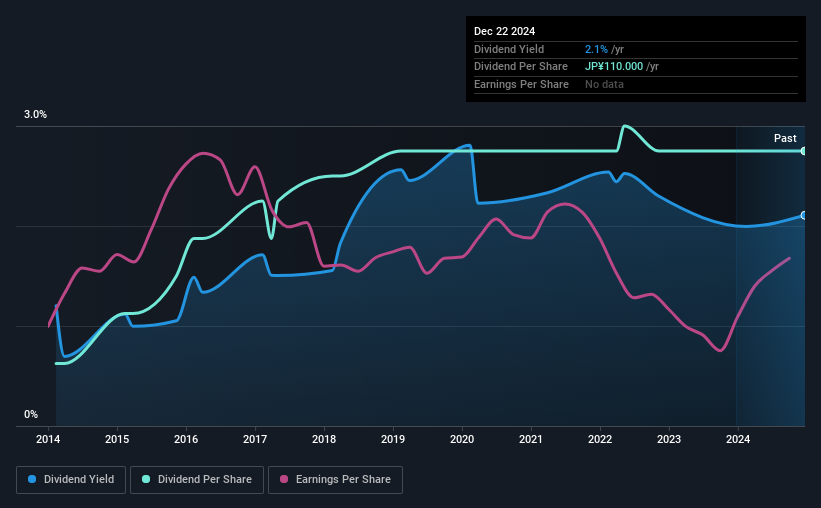
Regular readers will know that we love our dividends at Simply Wall St, which is why it's exciting to see Fukuda Corporation (TSE:1899) is about to trade ex-dividend in the next three days. The ex-dividend date is one business day before a company's record date, which is the date on which the company determines which shareholders are entitled to receive a dividend. The ex-dividend date is important as the process of settlement involves two full business days. So if you miss that date, you would not show up on the company's books on the record date. Thus, you can purchase Fukuda's shares before the 27th of December in order to receive the dividend, which the company will pay on the 28th of March.
The company's next dividend payment will be JP¥110.00 per share. Last year, in total, the company distributed JP¥110 to shareholders. Calculating the last year's worth of payments shows that Fukuda has a trailing yield of 2.1% on the current share price of JP¥5220.00. Dividends are an important source of income to many shareholders, but the health of the business is crucial to maintaining those dividends. So we need to check whether the dividend payments are covered, and if earnings are growing.
Check out our latest analysis for Fukuda
Dividends are typically paid from company earnings. If a company pays more in dividends than it earned in profit, then the dividend could be unsustainable. Fukuda has a low and conservative payout ratio of just 18% of its income after tax. That said, even highly profitable companies sometimes might not generate enough cash to pay the dividend, which is why we should always check if the dividend is covered by cash flow. It paid out 12% of its free cash flow as dividends last year, which is conservatively low.
It's positive to see that Fukuda's dividend is covered by both profits and cash flow, since this is generally a sign that the dividend is sustainable, and a lower payout ratio usually suggests a greater margin of safety before the dividend gets cut.
Click here to see how much of its profit Fukuda paid out over the last 12 months.

Have Earnings And Dividends Been Growing?
Companies that aren't growing their earnings can still be valuable, but it is even more important to assess the sustainability of the dividend if it looks like the company will struggle to grow. Investors love dividends, so if earnings fall and the dividend is reduced, expect a stock to be sold off heavily at the same time. That explains why we're not overly excited about Fukuda's flat earnings over the past five years. We'd take that over an earnings decline any day, but in the long run, the best dividend stocks all grow their earnings per share.
Another key way to measure a company's dividend prospects is by measuring its historical rate of dividend growth. In the past 10 years, Fukuda has increased its dividend at approximately 16% a year on average.
Final Takeaway
From a dividend perspective, should investors buy or avoid Fukuda? While it's not great to see that earnings per share are effectively flat over the 10-year period we checked, at least the payout ratios are low and conservative. All things considered, we are not particularly enthused about Fukuda from a dividend perspective.
On that note, you'll want to research what risks Fukuda is facing. Our analysis shows 1 warning sign for Fukuda and you should be aware of it before buying any shares.
A common investing mistake is buying the first interesting stock you see. Here you can find a full list of high-yield dividend stocks.
New: AI Stock Screener & Alerts
Our new AI Stock Screener scans the market every day to uncover opportunities.
• Dividend Powerhouses (3%+ Yield)
• Undervalued Small Caps with Insider Buying
• High growth Tech and AI Companies
Or build your own from over 50 metrics.
Have feedback on this article? Concerned about the content? Get in touch with us directly. Alternatively, email editorial-team (at) simplywallst.com.
This article by Simply Wall St is general in nature. We provide commentary based on historical data and analyst forecasts only using an unbiased methodology and our articles are not intended to be financial advice. It does not constitute a recommendation to buy or sell any stock, and does not take account of your objectives, or your financial situation. We aim to bring you long-term focused analysis driven by fundamental data. Note that our analysis may not factor in the latest price-sensitive company announcements or qualitative material. Simply Wall St has no position in any stocks mentioned.
About TSE:1899
Flawless balance sheet established dividend payer.


